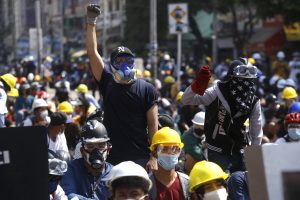Security forces shot dead two people in northern Myanmar on March 8, local media reported, as the military government continued its attempt to stamp out opposition to its February 1 coup.
The Irrawaddy newspaper said the victims were shot in the head during anti-coup protests in Myitkyina in Kachin State. Graphic video on social media showed protesters in the street backing away from tear gas, responding with rocks, then fleeing after a fusillade of what seemed to be automatic gunfire.
Demonstrators hurriedly carried away a number of injured people, including one apparent fatality, a person who had sustained a severe head wound. A second body was seen later on a stretcher, his head covered with a cloth.
To date, the government’s violent crackdown has left more than 50 protesters dead. At least 18 people were fatally shot on Sunday last week and 38 on Wednesday, according to the U.N. Human Rights Office.
Security forces also clamped down on anti-coup protesters elsewhere Monday, firing tear gas to break up a crowd of about 1,000 people who were demonstrating in the capital, Naypyidaw. The protesters deployed fire extinguishers to create a smoke screen as they fled from authorities.
Thousands of protesters who marched in Mandalay, the country’s second-largest city, dispersed on their own amid fears that soldiers and police were planning to use force to break up their demonstration.
Meanwhile, an armed force from one of Myanmar’s ethnic groups deployed to protect anti-coup marchers in the wake of a brutal junta crackdown.
The unit from the Karen National Police Force (KNPF) arrived shortly after dawn to accompany about 2,000 protesters near Myitta in Tanintharyi Region in southeastern Myanmar. They carried an assortment of firearms including assault rifles as they marched ahead of the column down dusty rural roads.
The KNPF are under the control of the Karen National Union (KNU), one of many ethnic organizations that have been fighting for greater autonomy from the central government for decades. The KNU employs both political and, through its armed wing, military means to achieve its aims.
Large-scale protests have occurred daily across many cities and towns in Myanmar since the country’s military seized power, and security forces have responded with ever greater use of lethal force and mass arrests.
Details of protests and actions by security forces have been reported extensively by news media and by individuals on Facebook and elsewhere. On Monday evening, the military government announced that the licenses of five local media outlets — Mizzima, DVB, Khit Thit Media, Myanmar Now, and 7Day News — have been canceled.
“These media companies are no longer allowed to broadcast or write or give information by using any kind of media platform or using any media technology,” it said on state broadcaster MRTV.
The coup and its violent aftermath have led foreign governments and international organizations to impose measures against Myanmar’s military leaders.
In the latest case, Australia suspended its defense cooperation with Myanmar and is redirecting humanitarian aid in the country because of the military takeover and detention of an Australian citizen.
Australian Foreign Minister Marise Payne said Monday that diplomats and relatives had only been able to contact economic policy adviser Sean Turnell twice by phone since he was detained in early February. She described the access as “very limited consular support.”
Australia announced late Sunday that it had suspended a defense training program with Myanmar worth about 1.5 million Australian dollars ($1.2 million) over five years. The program had been restricted to noncombat areas such as English-language training.
Australian humanitarian aid will be directed away from the Myanmar government and government-related entities. Instead it will focus on the immediate humanitarian needs of the most vulnerable and poor in Myanmar, including the Rohingya and other ethnic minorities, Payne said.
On March 7, police occupied hospitals and universities and reportedly arrested hundreds of people involved in protesting the military takeover.
In Myanmar’s largest city, Yangon, gun shots from heavy weapons rang out for a second straight night in several neighborhoods after the start of an 8 p.m. curfew. The sounds of what apparently were stun grenades could also be heard on videos posted on social media.
The use of such weapons after protesters had left the streets appeared to be part of a strategy to strike fear in anyone who might think about defying the authorities. In a similar vein, many filmed incidents of police and soldiers show them savagely beating protesters they had taken into custody.
Some of the shooting was heard near hospitals, where reports said neighborhood residents sought to block the entry of police and soldiers.
Security forces have often targeted medical personnel and facilities, including ambulances and their crews. Members of the medical profession launched the Civil Disobedience Movement, which is the nominal coordinator of the protests, frequently hailed on demonstrators’ signs by its initials CDM. Taking over hospitals would allow the authorities to easily arrest wounded people presumed to be protesters.
Meanwhile, a Canadian-Israeli lobbyist hired by Myanmar’s junta said the ruling generals want to get out of politics and shift the nation away from China.
Ari Ben-Menashe, who previously represented Sudan’s military leader and Zimbabwe’s Robert Mugabe, spoke to The Associated Press on Sunday from the United States after returning from his second trip in the past month to Myanmar.
He said he was confident he can persuade the Biden administration to lift sanctions imposed on military leaders who directed the coup last month that deposed and detained Myanmar’s elected leader, Aung San Suu Kyi.
He said the U.S. and others in the West have reduced Myanmar’s political conflict to a black and white tale of military repression against pro-democracy activists and ignore the exclusion of millions of minority members from voting in last year’s election.
By the Associated Press from Mandalay, Myanmar.

































